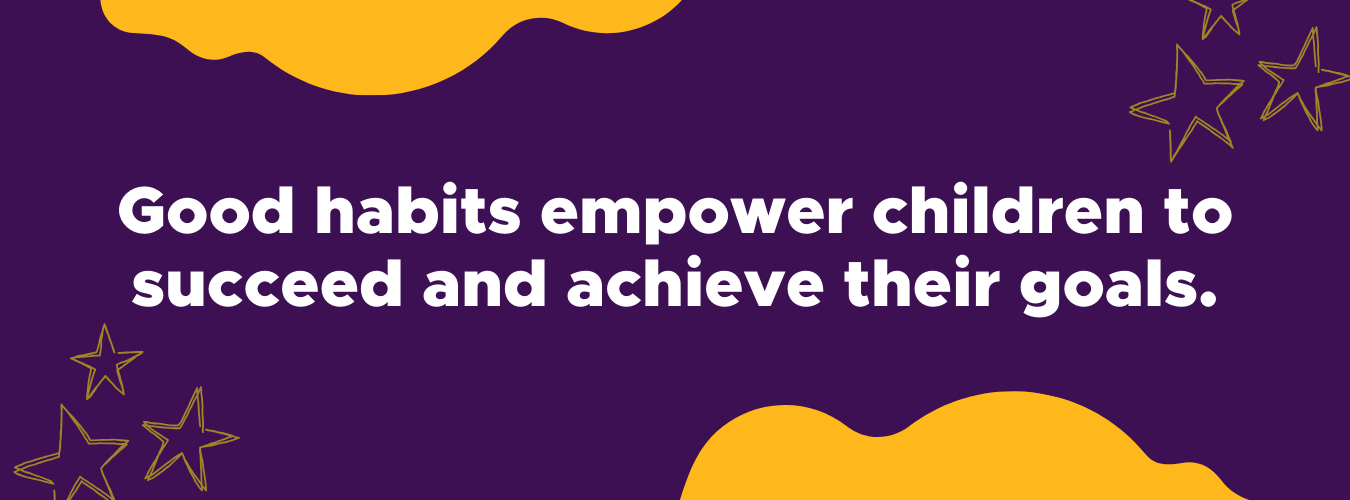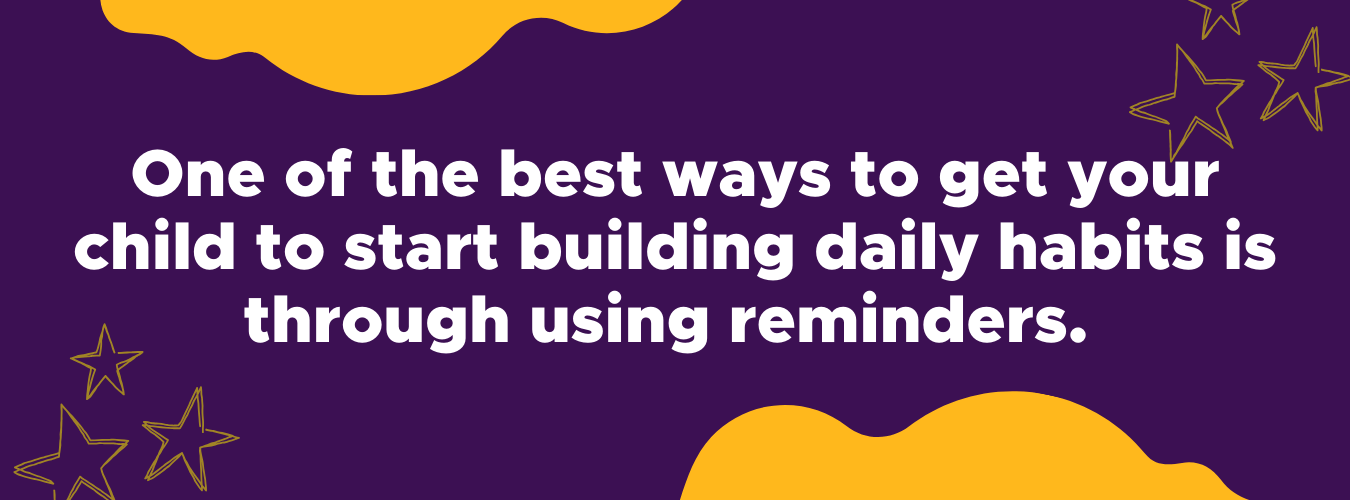Ways to Help Children Make Daily Habits Stick

"Imagine a life where success flows effortlessly, where your every action aligns with your aspirations. The secret? It's all in your habits.
Now, think about the children in your life. How can we empower them for a future brimming with achievement and fulfilment? The answer lies in nurturing healthy habits from the get-go. Habits are important in building strong foundations for success in our lives. Our daily habits and choices, across all areas of our lives, inform who we are as people and the quality of our lives. Forming healthy habits in children is important to set them up for success later in life.
Is your child struggling to keep up with schoolwork? Are they falling behind? Are they bored in class? Or are you looking for extension work for your child? Check out our eBook to learn more about how we help your child improve academically and build confidence through our in-centre after-school tuition.
Habits stick when children are conscious of the purpose and can see the wider picture or motivation for making healthy choices that support their goals. This blog outlines ways to help your children build healthy habits.
Set goals and understand the purpose of good habits
Good habits empower children to succeed and achieve their goals. Before introducing a new habit to your child, help them to understand the benefits. Start by thinking through your child’s goals and aspirations. This could be an academic goal, like receiving the Top in Class award at the end of the school year or levelling up at after-school tutoring.
Perhaps they want to play in the orchestra and need to finesse their playing skills before auditioning. Whatever their goal is, get this clear in their mind so they understand what they are working towards. This will help them to build habits and sustain motivation to study or practice towards their goals.

Habit stacks
Habit stacks are a great way to introduce a string of positive habits and new behaviours to your child. An example of a good habit stack for a school student might be:
Before bed:
• Pack my book bag
• Prepare my uniform and school shoes
• Bath/shower & clean my teeth
• 10 pages of reading
• In bed by [insert bedtime]
A habit stack like this helps to set children up for success in the morning. If their goal is getting to school on time, then a habit stack like this enables them to be prepared ahead of time, and reduce stress in the morning. Habit stacks can be introduced to any area of a child’s life, such as during weekday mornings or after school.
Habit stacks trigger a series of behaviours that become natural over time, and empower children to stay on track and achieve their goals. You can introduce these habits by starting small and building on the existing habit stack, to ease into the daily routine.
Habit formation and reminders
One of the best ways to get your child to start building daily habits is through using reminders. Reminders trigger the thought process needed to take the required action. However, you don’t want to feel like you are nagging your child constantly, so setting alarms or visual reminders can work effectively.
Visual charts on the fridge or in the bathroom can be a great prompt to assist your child in remembering what actions they need to take. You could try a checklist, or a habit formation or tracker chart such as these printables, which have daily boxes to colour in when the action is completed.
You will probably find that you need to remind your child at the beginning to set off the process until they’re used to the visual reminders.

Routine
Building a routine around the habits, behaviours and actions you want your child to follow will help them to remember to do it. This could be a ready-for-school morning routine where you expect your child to get dressed, have breakfast, brush their teeth, and hair, and get their school bag ready at the door.
You can make this fun by printing pictures to create a visual timetable, such as a picture of a t-shirt saying “get dressed’, and pictures of an apple, toothbrush, hairbrush and bag, brushing your teeth and then displaying the timetable so they can follow the guide.
This ensures that your children know exactly what they’re expected to do. You can help them by practising the routine together so they are influenced by your actions.
Habits can become second nature if they are approached with consistency, and built into daily routines. For example, at first, it may seem challenging to carve out 30 minutes every day for reading. But by building it into their routine through dedicating time to the task, removing distractions, and making it as easy and attractive as possible for your child, they will soon enjoy their task.
You could set them up in a pile of pillows or their reading nook, with a book they enjoy reading. Do this every day at the same time, and provide a reward, such as their favourite fruit or playtime afterwards.
Rewards
Rewarding good behaviour with something small but meaningful is one of the best ways of making habits stick with children. A small reward for habit could be praise, a high five or extra time playing outside. Sometimes even doing the new routine can become rewarding.
For example, if part of their after-school routine is to practice the piano, as they improve they are more likely to enjoy the intrinsic reward of practising more and therefore enjoy this daily habit.
Or you could put in place a reward system to encourage your child to develop daily habits without the need for praise every single time. You can create a reward system around their habit tracker and when an action is filled in for a whole month, have a pre-planned fun activity or outing together.

Allocate homework and study time for specific subjects
By starting the habit early, of blocking out homework and study time, children will be well prepared in allocating time after school to manage the demands of each of their subjects. This can influence their study habits at university and in the workplace too.
Establish healthy habits and well-being
A routine that includes eating healthily, getting enough sleep and doing exercise provides countless benefits for students that will see them through disruptive transitions in their lives such as leaping at high school or university.
Research shows just how linked sleep is to mental health and academic performance. Making sure that there is wind-down time at the end of the day is also necessary. Reading a book in bed before going to sleep is a great habit to face the next day with plenty of energy and resilience.

Time for reflection
Procrastination can halt children, especially as academic workload increases and seems inevitable to conquer or when free time can tempt them towards play or any activity other than school work.
We are all familiar with the last-minute deadline scramble and know that the outcome is often not as polished compared but what is done when dedicated time has been given to iterate and refine work?
By encouraging your child to start or end the day with a few hours of reflection on just what they are proud of, what they have learnt, and what they are excited about, a jolt of enthusiasm can spark their motivation and focus for the next day or week.
Building good habits is essential for everyone, but it can be easier for children, especially when they have positive role models around them. To encourage your child to establish healthy habits, try out these strategies, and let us know what has worked for your family.

Celebrate Your Child's Success with NumberWorks'nWords
At NumberWorks’nWords, our tutors help young learners not only achieve their academic goals but also develop good learning habits and positive behaviour, in a nurturing environment. Our expert tutors help learners develop good habits and model positive behaviour, in a caring environment that celebrates success.
If you want to learn more about our maths and English tutoring programmes, contact your local centre and book a free assessment.




